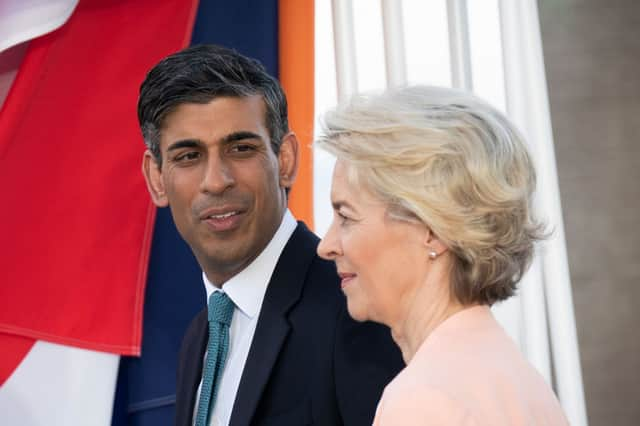Horizon scheme: what is important EU science research programme? Reports UK close to rejoining after Brexit
This article contains affiliate links. We may earn a small commission on items purchased through this article, but that does not affect our editorial judgement.
and live on Freeview channel 276
The UK is reportedly close to agreeing a deal to rejoin the EU's Horizon science research programme, in what could be another Brexit climbdown.
Britain left the pan-European funding scheme during negotiations over Northern Ireland, despite the country's leading scientists saying it would cause significant damage. It was seen as one of the best reasons for remaining in the EU.
Advertisement
Hide AdAdvertisement
Hide AdThe Conservative government had been considering a UK-based alternative to the collaboration scheme known as Pioneer. However now reports in the Times say an announcement about rejoining Horizon could happen as soon as next month after "significant" progress in negotiations.
It would mark another Brexit U-turn after the government announced that it was keeping the European CE product mark, and post-Brexit food checks have been delayed again.
What is Horizon Europe?
Horizon Europe is a EU funding programme, which will allocate around £81 billion of grants to scientific projects between 2021 and 2027. It follows the Horizon 2020 programme, which ran from 2014 to 2020 and the UK was a part of. EU member states and Horizon associate members, which Britain could become, contribute the funds which get allocated to individuals or institutions on merit.
The aim is to tackle the continent and world's most pressing issues from disease to climate change and energy security. Britain historically received more back in grants than money it paid into the programme, and a report in 2016 found scientific and medical research was significantly propped up by EU funding.
Advertisement
Hide AdAdvertisement
Hide AdThe UK Research and Innovation fund has been providing grants which otherwise would have been given by Horizon, however scientists argue that collaborating across Europe is what makes the programme so successful.


What have scientists said?
Sir Patrick Vallance, who was previously the chief scientific officer to the government, has said we should have already joined the Horizon scheme and the ongoing absence was "damaging" for the UK and Brussels.
Vallance, who played a central part in the handling of the Covid pandemic by Boris Johnson’s government, said it wasn't “sensible” to build a domestic scheme when a Europe-wide version is “ready for us to join”.
Speaking about Britain being outside of Horizon during his time as chief scientific adviser, he said: “It caused me frustration inside (government), and it caused me pain and frustration outside. It is absolutely clear. A system like Horizon that allowed great collaboration right the way across Europe is now geopolitically important.
Advertisement
Hide AdAdvertisement
Hide Ad“China is in ascendancy in science and technology. America has obviously been doing great stuff but it has also become a little bit more protectionist. And we have suddenly cut ourselves off from this system. It is damaging to the EU and it is damaging to the UK.”


While Sir Paul Nurse, director of the Francis Crick Institute, wrote in The Times: “Negotiations have been bogged down in accounting details, losing sight of the vision and the prize to be won.
"I encourage the Prime Minister to finalise the agreement without further delay and recommend that working scientists be asked to help get this over the line. UK science has been burning like Rome as Nero fiddles, but this is our opportunity to stem further damage and rebuild as a science superpower.”
And commenting on the possibility of a deal, Professor Sarah Main, executive director of the Campaign for Science and Engineering, said: “This is an encouraging development.
Advertisement
Hide AdAdvertisement
Hide Ad"If confirmed, this raises the promising prospect of a deal within days, which would be the best of news for UK science.
“I urge the Prime Minister and president of the European Commission to secure this agreement, enabling researchers to get on with the vital role they play in improving people’s lives and livelihoods.”
AstraZeneca and GSK - Britain's two biggest pharmaceutical companies - have both told the government to rejoin Horizon, with AstraZeneca saying it would be “an important step to ensure the UK is seen as a trusted partner and attractive location for life sciences”.
Will the UK rejoin Horizon?
The UK was excluded from the £81 billion scheme in a tit-for-tat retaliation over post-Brexit trading rules for Northern Ireland in 2020. However, negotiations to rejoin started after Rishi Sunak agreed the Windsor framework in February.
Advertisement
Hide AdAdvertisement
Hide AdThe Prime Minister has remained concerned over the price of rejoining the programme, and Downing Street has said he is seeking “value for money”. In July, sources revealed that a draft text had been put in front of Sunak. The Prime Minister’s official spokesman said talks had been “constructive … but we continue to explore all options including a UK-based option, which is the Pioneer alternative”.
“Overall we want to make sure that any deal whether it’s the Horizon or the UK alternative Pioneer is the one that produces the best value for UK science and research and also for taxpayers.”
And the Times has now reported that Sunak is keen to get the deal signed off. He is reportedly concerned that it could become an electoral issue, as Labour has committed to rejoining Horizon. Given the country's leading scientists - including Sir Patrick Vallance and Sir Paul Nurse - are urging the government to rejoin, it would be surprising if Sunak was unable to agree a deal.
Comment Guidelines
National World encourages reader discussion on our stories. User feedback, insights and back-and-forth exchanges add a rich layer of context to reporting. Please review our Community Guidelines before commenting.
